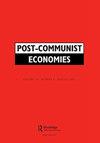Migrants remittances and fertility in the Post-Soviet states
IF 1.8
3区 经济学
Q2 ECONOMICS
引用次数: 0
Abstract
ABSTRACT The demographic consequences of remittance flows to the developing countries have so far received scant attention. In this study, we examine the impact of migrants’ remittances on fertility by employing unbalanced panel data from Post-Soviet states. During the last three decades, these countries witnessed large-scale out-migration accompanied by high inflows of migrants’ remittances, and went from a high mortality – high birth rate to a low mortality – low birth rate regime. Employing standard panel estimation methods and instrumental variable (IV) approach, we find evidence for a significant negative association between remittances and fertility. These findings are robust to alternate measures and strategies. The impact of remittances is significant beyond a minimum threshold and has strengthened over time. The findings of the study highlight the remittances’ substitution effect contributing to the post-communist countries’ demographic transition.后苏联国家移民汇款与生育率
到目前为止,汇款流向发展中国家的人口后果很少受到关注。在这项研究中,我们通过使用后苏联国家的不平衡面板数据来检验移民汇款对生育率的影响。在过去三十年中,这些国家出现了大规模的移民外流,同时移民汇款大量流入,并从高死亡率-高出生率制度转变为低死亡率-低出生率制度。采用标准面板估计方法和工具变量(IV)方法,我们发现汇款与生育率之间存在显著负相关的证据。这些发现对替代措施和战略是有力的。汇款的影响是巨大的,超过了最低限度,而且随着时间的推移已经加强。研究结果强调了汇款的替代效应对后共产主义国家人口结构转型的贡献。
本文章由计算机程序翻译,如有差异,请以英文原文为准。
求助全文
约1分钟内获得全文
求助全文
来源期刊

Post-Communist Economies
ECONOMICS-
CiteScore
4.90
自引率
18.20%
发文量
21
期刊介绍:
Post-Communist Economies publishes key research and policy articles in the analysis of post-communist economies. The basic transformation in the past two decades through stabilisation, liberalisation and privatisation has been completed in virtually all of the former communist countries, but despite the dramatic changes that have taken place, the post-communist economies still form a clearly identifiable group, distinguished by the impact of the years of communist rule. Post-communist economies still present distinctive problems that make them a particular focus of research.
 求助内容:
求助内容: 应助结果提醒方式:
应助结果提醒方式:


